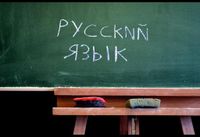In a significant shift in educational policy, Latvia is set to amend its Education Law, allowing students to opt out of studying Russian as a second foreign language if their school cannot provide an alternative foreign language course. This draft law, prepared by the National Association and endorsed by both opposition and ruling coalition parties, reflects a broader trend in the Baltic state towards European integration and away from the legacy of the former Soviet Union.
The proposed changes will take effect starting from the next academic year or the following one, with educational institutions required to offer courses in one of the official languages of the European Union or the European Economic Area by September 1, 2025. Ilze Indriksone, the chairman of the National Association and a deputy in the Saeima, emphasized that these amendments are part of a unified approach to education in Latvia, reinforcing the principle that the second foreign language must be a European language rather than a remnant of imperial history.
Indriksone stated, "These amendments continue the already adopted regulations and form a unified approach throughout the Latvian education system." The move is part of an ongoing transition in the education sector, phasing out Russian as a mandatory second foreign language in general and vocational education.
The commentary from press.lv highlighted that while many might consider other pressing issues in Latvia, such as reducing bureaucratic positions, improving healthcare access, or lowering the costs of goods, the focus on the Russian language remains prominent. The article suggests that the ongoing discussions around language education are indicative of deeper societal changes and sentiments within Latvia.
Meanwhile, across the border in Ukraine, a similar trend is emerging. The number of schoolchildren studying Russian as a separate subject has plummeted by five times, now totaling just 768 students. This decline is attributed to a growing refusal among parents to allow their children to learn Russian, a reflection of the societal backlash against Russia's military actions in Ukraine.
Serhiy Babak, the head of the Committee on Education, Science, and Innovation, reported this dramatic reduction in students learning Russian. He noted, "There is a positive trend, as parents are refusing to have their children study Russian." In the 2023/2024 academic year, only three educational institutions in Ukraine offer Russian as a separate subject.
Babak explained that the derusification process in schools is not driven by changes in legal frameworks or administrative pressures but is rather a response from Ukrainian society to the atrocities committed by Russia against the Ukrainian people. He stated, "The process of derusification is a reaction of Ukrainian society to Russia's military crimes and genocide against the Ukrainian people."
Despite this trend, Babak acknowledged the challenges of completely banning the Russian language in schools, citing its status as a language of a national minority. He warned that such a prohibition could lead to accusations of discrimination, complicating Ukraine's aspirations for European Union membership.
In both Latvia and Ukraine, the educational landscape is evolving in response to historical and contemporary geopolitical realities. The amendments in Latvia aim to reshape the language education framework to align more closely with European standards, while Ukraine's educational policies reflect a strong societal rejection of Russian influence following the ongoing conflict.
As these nations navigate their identities and educational policies in the wake of past imperial legacies, the decisions being made today will undoubtedly shape the futures of their youth. The shift away from Russian in educational systems highlights a broader movement towards embracing European languages and cultures, signaling a significant cultural and political realignment in the region.
In conclusion, the developments in both Latvia and Ukraine illustrate a growing commitment to redefining national identities through education. As these countries work towards integrating more closely with European norms, the emphasis on language education becomes not just a matter of curriculum but a reflection of their aspirations for the future.




